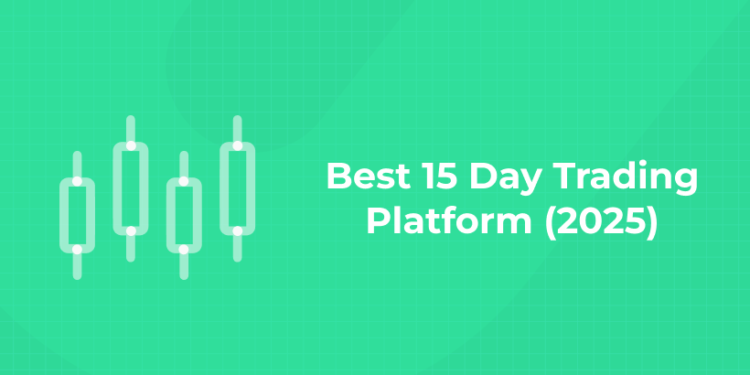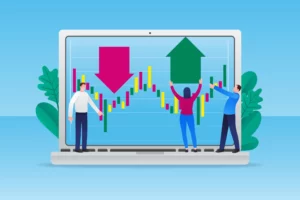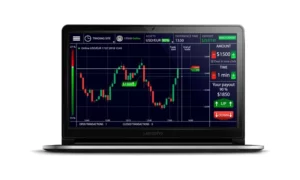Table of Contents
The practice of regularly purchasing and selling stocks after holding them for brief periods is known as day trading. Almost any broker’s platform allows day trading. Which day trading platform, though, is your personal favourite? In this article, we’ll look at how to select the best day trading platform and what you should know before attempting day trading.
Best Day Trading Platform: Introduction
Day trading is a popular technique used by investors to acquire and sell stocks quickly in a single day. However, this method calls for a lot of effort and focus, and just 13% of day traders appear to have made a profit, according to a prior University of California, Berkeley research. A good online trading platform or brokerage can help you achieve success in day trading.
Low costs, top-notch charting platforms, quick execution, access to international markets, leverage support for trading, and easily accessible minimum deposits are all features of the top-day trading brokers. They are also reliable. These requirements are met by every brokerage that we suggest in this guide. So let us read about a few of the best day trading platforms of the year 2025!
Best 15 Day Trading Platform (2025)
1: What is a stock?
You should have a basic understanding of the stock market fundamentals before venturing into looking for day trading platforms to sign up to. Learning stock market fundamentals from scratch is now easy with the Entri app stock market online course. They offer many features like live sessions, experienced mentors, practical trading advice etc.
The best day trading platforms are listed below.
AvaTrade
Founded in 2006, AvaTrade is a well-known FX and CFD broker that is governed by laws in nine different nations. The broker has over 400,000 registered users and executes over 2 million deals monthly. The company provides several trading platforms, such as its in-house WebTrader, MT4, and MT5. Day traders can access over 1250 financial instruments, including CFDs, AvaOptions, and now AvaFutures. Additionally, a complete education centre and bilingual customer assistance are provided.
Exness
Founded in 2008, Exness is a forex and CFD company with its headquarters in Cyprus. Remaining a highly esteemed global brand, the broker has over 260,000 clients, multiple accolades, and credible licensing. The well-liked MT4 and MT5 platforms, raw spreads, and many account kinds are all available to active day traders.
XM
XM is a well-known FX and CFD broker with over 10 million customers in more than 190 countries. This reliable broker has been well-known since 2009 for its affordable rates on more than 1000 instruments. ASIC and CySEC are two of the financial authorities that oversee XM.
Interactive Brokers
IBKR, or Interactive Brokers, is a top brokerage that offers a wide range of comprehensive financial services and access to 150 marketplaces across 33 countries. One of the most reputable brokers for trading globally, this Nasdaq-listed company has over 40 years of experience and complies with strict rules from the SEC, FCA, CIRO, and SFC, among others.
Deriv.com
Over 2.5 million people use the low-cost multi-asset broker Deriv.com worldwide. Along with patented synthetic products that are exclusive to the company, the firm offers CFDs, multipliers, and more recently accumulators, all of which have a $5 minimum deposit. Deriv offers the immensely popular MetaTrader 5 in addition to its customized charting software.
Want to learn stock market from experts? Join the SEBI Compliant Entri stock market course!
Robinhood
Investors who value cheap trading fees will find Robinhood ideal. Robinhood is renowned for having low commission costs. It is one of the few brokers that charge $0 for options fees $0 to purchase or sell stocks, including fractional shares. Crypto commissions are $0.0 on Robinhood, and low-margin rates are available to Robinhood Gold users.
Because Robinhood has experienced PR problems in the past, including the GameStop episode, some traders are dubious. The absence of certain sophisticated trading features in Robinhood may irritate some users.
E*TRADE
Investors who favour stocks and options should use E*TRADE. Commission-free stock and ETF trading is combined with a top-rated trading platform at E*TRADE. It also has real branches you may go to if you need help in person. For trading options, E*TRADE does impose fees, but its margin fees could be more appealing.
Tastytrade
Investors that value options and futures should use Tastytrade. The only broker in this list giving priority to their options trading platform is Tastytrade. Especially for high-volume traders, its distinctive commission structure is more economical than competing companies. It’s not very beginner-friendly because of its feature-rich platform, and its margin rates are mediocre.
| Learn the Stock Market in your Mother Tongue | |
| Stock Market Course in Malayalam | |
| Stock Market Course in Tamil | |
| Stock Market Course in Kannada |
Webull
Webull is the best option for investors who value their mobile investments. One of the greatest and most feature-rich smartphone apps available is Webull’s. Trading stocks (including fractional shares), ETFs, and options are free of charge. The platform provides competitive prices for margin. In comparison to other mobile trading platforms, the Webull app is a little trickier to use and doesn’t allow cryptocurrency trading.
Charles Schwab
A major benefit for traders is that Schwab, which acquired TD Ameritrade in 2020, is now the home of the excellent thinkorswim platform suite. Intermediate traders will find the learning curve to be acceptable despite the strength of the desktop and mobile platforms. The abundance of videos, webinars, and articles, along with the online trading coaches, will be helpful to novice traders.
TradeStation
One of the first PC trading platforms was TradeStation. For automated trading and backtesting, TradeStation’s current version remains a great option. EasyLanguage, an in-house programming language, has an enthusiastic user base and is well-documented.
Cobra
One of the primary tactics used by day traders is short selling. Professional day traders in the stock and options markets are the target market for Cobra Trading. Through its Venom Trading branch, it also provides futures trading. Cobra Trading provides a good selection of platforms, affordable commissions, and dependable customer service.
One area in which Cobra Trading excels is in making penny stocks and other inexpensive securities easier to short-sell. Brokerage companies maintain lists of Easy to Borrow (ETB) equities, which are composed of highly liquid stocks that are readily convertible into short sales. Some equities, meanwhile, are not as easily accessible for short selling as they are for day traders. These are frequently penny or small-cap stocks, which are appealing in part due to their extreme volatility.
Cobra Trading has access to several locate sources, including the free HTB (hard to borrow) locates provided by Wedbush Securities, its clearing firm. The different securities lending companies are the sources from which clients can seek and borrow shares that are difficult to borrow. You can check inventory from four separate locate sources in the locate monitor pane of Cobra Trading’s DAS trading platform. Traders who have access to various sources are more likely to locate the shares they are looking to short-sell.
Lightspeed Trading
In the realm of day trading, an instant can determine whether a trade is profitable or not. Lightspeed Trading, as its name implies, has put a lot of effort into making sure that clients can place trades and obtain market data as quickly as possible, with a particular emphasis on catering to professional and institutional traders.
With no extra bells and whistles, the Lightspeed Trader platform has been pared down to concentrate on data and order execution. The platform offers incredibly low latency, exceptional stability, and extensive customization. Lightspeed Trading’s tools and technology are made to help traders take advantage of market opportunities quickly.
Fidelity
As a well-rounded broker, Fidelity is well-known for having flexible trading platforms. The platform’s customization choices were amazing, and our tester found the shortcuts and user experience to be quite intuitive. Among the brokers on this list, Fidelity is the only one to have received five stars for platform, user experience, and execution excellence.
ZackTrade
Customers of ZacksTrade now have access to a rebranded version of Interactive Brokers’ trading platforms since ZacksTrade is Interactive Brokers’ introducing broker. This is advantageous for day traders as Interactive Brokers is renowned for its robust, pro-level systems. Although ZacksTrade generally has higher costs, it is unique in the OTC stock trading market.
Get the best teachers to learn stock trading from! Register here!
Best Day Trading Platform: Conclusion
There are a lot of competitors that IBKR may face in particular domains. Webull is less expensive, TradeStation offers superior backtesting and tastyworks from tastytrade offers a better overall options trading experience. However, no broker can currently match IBKR point-for-point in this industry. It is a day trader’s dream in terms of continuously discovering fresh pricing inefficiencies to exploit across markets and asset classes because of its tools, asset range, quickness, and global reach.
Webull, of course, provides a fairly strong platform considering its no (direct) cost strategy. Webull offers practically free entry into the market for anyone wishing to day trade on the cheap. But as you get more experienced as a trader, the appeal of IBKR’s extensive services increases.
Stock Market Training Reviewed & Monitored by SEBI Registered RA
Trusted, concepts to help you grow with confidence. Enroll now and learn to start investing the right way.
Know moreFrequently Asked Questions
Can you trade day on more than one platform?
Indeed. It is typical for day traders to use various trading platforms and maintain multiple brokerage accounts. A trader can favour one broker’s chart analysis tools over another’s when trading options with the former. Additionally, it’s a good idea to keep a backup account active and available if your favourite broker has a data loss or crash.
What does a pattern day trader do?
You will be classified as a “pattern day trader” once you execute four-day trades in five working days. If the broker has reasonable suspicions that you would day trade regularly, it may also label you as a pattern day trader. To day trade, pattern day traders need to keep $25,000 in equity. Their accounts won’t be able to exit positions during the day if they don’t keep that amount of equity. In addition, pattern day traders can be able to use more leverage than other margin investors.
Is day trading permitted?
It is legal to engage in day trading. However, you will have to abide by specific margin requirements and meet a minimum capital requirement of $25,000 if you day trade regularly, which is defined as four or more round-trip day trades in a five-business-day period.
Which Trading Platform Is Most Popular Among Day Traders? What Advantages Does Day Trading Offer?
Depending on the kind of trader they are, most people use different kinds of trading platforms. While day traders may find Interactive Brokers to be the greatest alternative, other traders may prefer Charles Schwab’s diversity or Fidelity’s adaptability. SoFi Investing or Ally Invest may be useful to novice traders. The one that is best for you could not be the best for someone else.
Traders can make quick money by taking advantage of brief market swings through day trading. Since day traders frequently cancel their bets before the market closes, they can also operate with a lower overnight risk.
Does Day Trading Require a Broker?
Yes, to day trade, you often need a broker. The infrastructure and platform needed to carry out intraday trades in the financial markets will be supplied by your broker.
Are day traders required to pay taxes?
Yes, taxes must be paid by day traders. If your day trading is considered a business, the taxes you pay can be different; if not, you are taxed as an investor. The U.S. Internal Revenue Service (IRS) Form Schedule D (Form 1040), Capital Gains and Losses, and Form 8949, Sales and Other Dispositions of Capital Assets, are the forms that investors must use to report capital gains and losses. Individuals are currently only taxed on capital gains at a maximum rate of 15%; however, numerous exceptions allow for rates as high as 20% or 28%.
Which kind of trading is most effective for Day Trading? How Does Day Trading Work?
Even though you can trade exchange-traded funds (ETFs), bonds, and mutual funds, stocks remain a top choice for day traders. To capitalize on transient price changes, day traders purchase and sell financial products on the same trading day.
What Is the minimum required amount to begin Day Trading?
Day trading platforms have different minimums for accounts. Some want thousands of dollars in exchange for enhanced features aimed at experienced traders. As an alternative, a lot of brokers accept deposits smaller than $500 as a minimum. Certain brokerages don’t even require a minimum deposit.
How can I create an account for Day Trading?
You will need to register with a broker to start a day trading account. Typically, this requires giving your basic contact information, as well as facts about your trading background and funding source. The entire process takes around fifteen minutes.
Before you can use all trading capabilities, the majority of regulated day trading firms additionally need you to provide proof of identity and address.
What are the risks associated with day trading?
Day trading has several hazards. First and foremost, there’s the chance of suffering financial loss if you make poor trading decisions as a result of market turbulence and emotional judgment.
Selecting a dependable and licensed day trading broker is crucial since there is a chance that you will sign up with dishonest brokers who are running scams.












